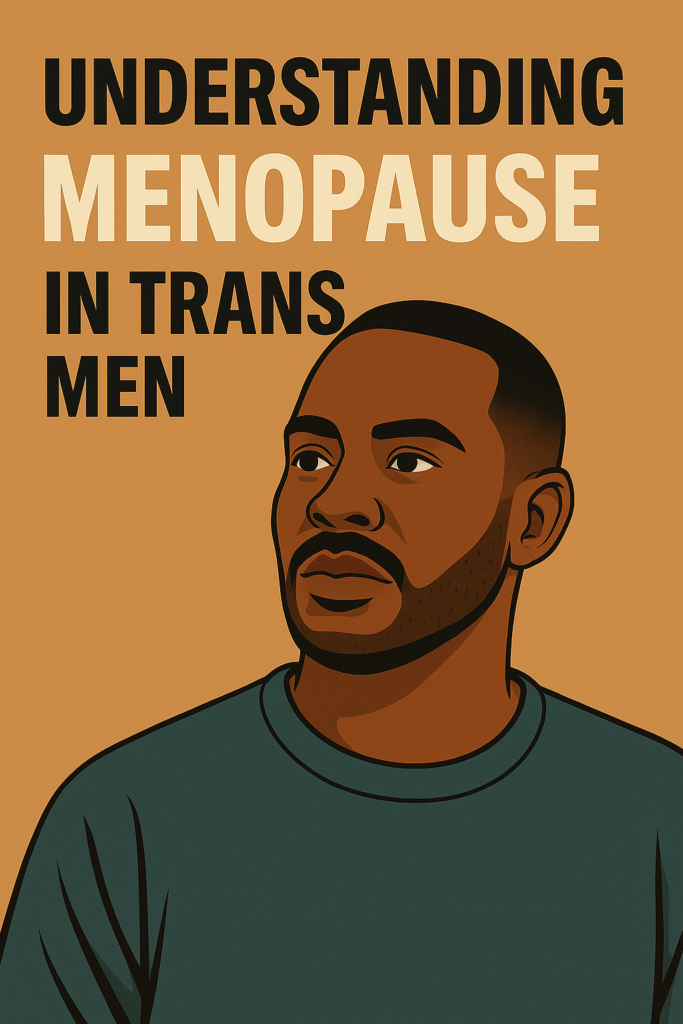
Who Is Affected?
Trans men — individuals who were assigned female at birth (AFAB) but identify as male — can experience natural, medical, or hormone-induced menopause, depending on their age, surgeries, or hormone therapy. This includes:
- Binary trans men
- Some non-binary or gender-diverse AFAB individuals
- Those who have or haven’t had hysterectomies or oophorectomies
- Those on or off testosterone (T)
Menopause in this population is real, physical, emotional, and too often ignored.
What Is Menopause — And How Does It Work in Trans Men?
Menopause refers to the natural or induced end of menstruation and fertility. In trans men, it can occur due to:
1. Natural Aging
- Typically between ages 45 and 55, just like cisgender women.
- If a trans man is not on testosterone, or has stopped taking it, the ovaries may resume their cycle and eventually lead to menopause naturally.
2. Testosterone Therapy
- Testosterone usually stops menstruation after several months, but that doesn’t always mean full menopause.
- Ovulation may still occur silently.
- Over time, T can trigger menopause-like symptoms or actual hormonal menopause — especially if ovarian function declines or becomes suppressed long-term.
3. Surgical Menopause
- Trans men who undergo a hysterectomy (removal of the uterus) and/or oophorectomy (removal of the ovaries) experience instant menopause — with more severe, sudden symptoms because the hormone drop is abrupt.
Where Does This Happen — and Where Are the Resources?
Across North America, the UK, and other Western healthcare systems, most public resources, clinics, and menopause content:
- Fail to mention trans men at all
- Use gendered language that alienates or excludes them
- Rarely train doctors on trans-inclusive menopausal care
The problem is global, but especially visible in hospital gynecology departments, primary care clinics, and even menopause support groups, where the assumption is that everyone experiencing menopause identifies as a woman.
When Does It Happen?
- Natural menopause tends to occur between ages 45–55.
- Surgical menopause can happen at any age if ovaries are removed.
- Testosterone-induced menopause-like changes may begin within 6–12 months of starting T.
- Symptoms may emerge any time testosterone is stopped, adjusted, or when ovarian function declines.
Why Is This a Big Deal?
Because most trans men:
- Don’t receive proper education about menopause
- Aren’t warned that hormone changes, even under T, can trigger menopause symptoms
- Feel dysphoric or distressed about symptoms that remind them of past female-bodied experiences
- Avoid doctors due to past medical trauma or misgendering
- Can’t find accurate info tailored to their identity and anatomy
This silence leads to:
- Missed diagnoses (thinking menopause symptoms are “just stress”)
- Untreated bone loss, heart risks, and mental health issues
- Isolation, fear, and confusion
How Does Menopause Feel for Trans Men?
Many trans men experience classic menopause symptoms:
- Hot flashes
- Night sweats
- Brain fog
- Mood swings or depression
- Vaginal dryness or irritation
- Sleep disturbances
- Anxiety
- Changes in libido or sexual discomfort
- Increased gender dysphoria
But the experience is often layered with emotional trauma, such as:
- The fear of “feminine” symptoms resurfacing
- The stress of having to visit a gynecologist or menopause clinic that doesn’t understand their body or identity
- Lack of vocabulary to talk about what’s happening
Some avoid care altogether — and suffer in silence.
How Is It Managed — and What Are the Options?
Trans men have multiple medical and non-medical options, but very few know they exist because most menopause care isn’t marketed to them.
🔹 Hormonal Support
- Testosterone therapy can alleviate many symptoms (especially hot flashes and mood swings), but it doesn’t replace estrogen’s protective effects for bones and heart.
- Some doctors prescribe low-dose estrogen or progesterone, even in trans men, to balance hormones — but this must be gender-affirming and dysphoria-sensitive.
🔹 Non-Hormonal Medications
- Antidepressants (SSRIs) for mood and hot flashes
- Gabapentin or clonidine for night sweats and nerve pain
- Vaginal moisturizers and lubricants for dryness (non-estrogenic if needed)
🔹 Lifestyle & Nutritional Strategies
- Weight training and calcium for bone health
- Omega-3s, magnesium, and B-vitamins for brain and mood support
- Sleep hygiene and CBT-I for insomnia
- Herbal therapies (like black cohosh, maca, etc.), with doctor supervision
🔹 Mental Health Care
- Therapy to process identity shifts, aging, and trauma
- Support groups with trans-affirming spaces
- Gender-affirming mindfulness and self-care practices
How Can Healthcare Be More Inclusive?
To properly care for trans men in menopause, the following changes are crucial:
✅ Language Matters
- Use “people experiencing menopause” instead of just “women.”
- Let trans men choose the language that fits their body and comfort.
✅ Provider Training
- Equip doctors with trans health training, including anatomy, hormone interactions, and trauma-informed care.
✅ Create Trans-Inclusive Resources
- Build educational content (brochures, videos, websites) that showcase diverse genders.
✅ Include Trans Voices in Research
- Most menopause studies still exclude trans participants.
- We need clinical data on how menopause affects AFAB trans people, especially those on long-term testosterone.
✅ Policy Reform
- Fund menopause care as part of gender-affirming healthcare
- Create national menopause strategies that are gender-inclusive
The Conversation Starts Here
Menopause is not exclusive to cisgender women. It affects anyone with ovaries — including trans men, non-binary people, and others who are too often erased from health conversations.
If we want health equity, we must talk openly, include all bodies, and give trans men the dignity of understanding what’s happening in their bodies without shame.
They deserve care.
They deserve clarity.
They deserve to thrive.